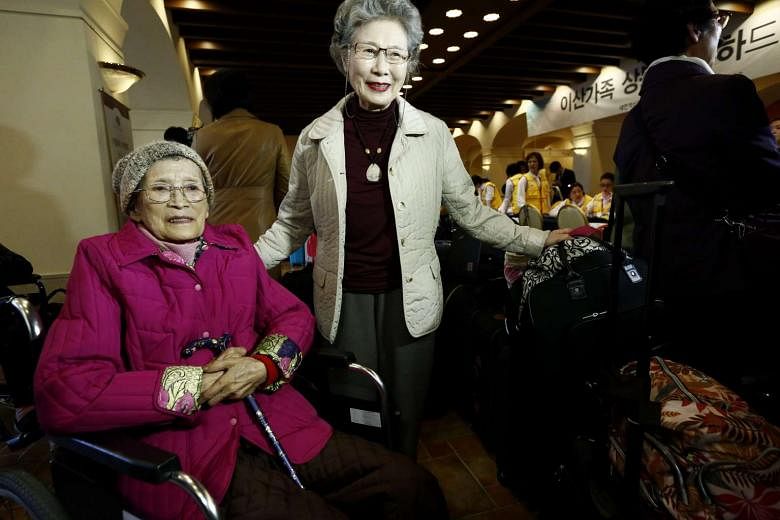SEOUL (AFP) - Some 250 mostly elderly South Koreans crossed into North Korea on Saturday (Oct 24) for a second round of emotional meetings with relatives they have either never met or last saw more than six decades ago.
The cross-border trip came two days after hundreds of other families from both sides wrapped up a three-day reunion on Thursday in the North Korean resort of Mount Kumgang.
The second group of families bringing gift packages, including clothes, watches, medicine, food and - in most cases - around US$1,500 (S$2,097) in cash are to meet relatives from Saturday to Monday.
The family reunion was only the second in the past five years - the result of an agreement the two Koreas reached in August to ease tensions that had pushed them to the brink of armed conflict.
But interaction was tightly controlled - limited to six, two-hour sessions, including meetings in a communal hall and private one-on-one time without TV cameras.
For the families, the 12 hours of total face time was heartbreakingly short after more than six decades of separation caused by the 1950-53 Korean War.
Given that there are more than 65,000 South Koreans currently on the waiting list for a reunion spot, those selected represent a very fortunate minority.
Millions of people were displaced by the sweep of the Korean conflict, which separated brothers and sisters, parents and children, husbands and wives.
Because the conflict ended with an armistice rather than a peace treaty, the two Koreas technically remain at war and direct exchanges of letters or telephone calls are banned.
Among the South Korean generation that actually experienced the division, the vast majority died without ever having any contact with their relatives in the North - and, in many cases, without knowing if they were even alive.
With the mortality rate of reunion candidates increasing with every passing year, many accept they may never be selected and have resorted instead to taping video messages - and providing DNA samples - that might allow for some posthumous contact in the future.
The reunion programme began in earnest after a historic North-South summit in 2000, and was initially an annual event.
But Pyongyang has long manipulated the reunion issue as a tool for extracting concessions from Seoul, and sees its agreement to hold the meetings as an act of diplomatic largesse that merits reward.
South Korea's presidential security advisor Kim Kwan-Jin said Thursday that Seoul would push for fresh talks with Pyongyang on arranging family reunions regularly.
"If the two Koreas make progress, we can hold family reunion events on a regular basis and check whether or not they are alive," he said.

